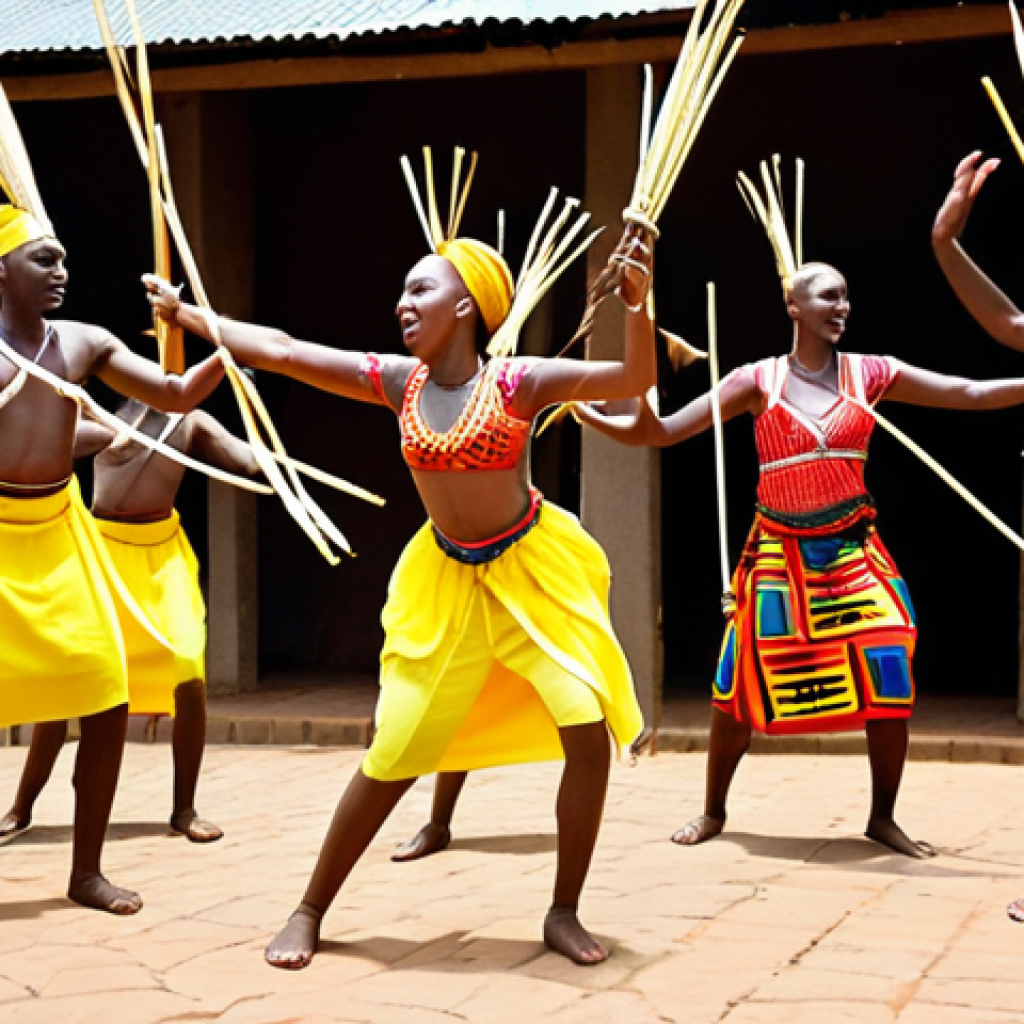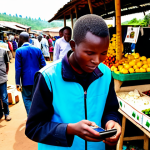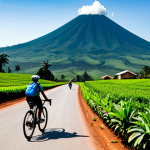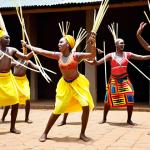Rwanda, the land of a thousand hills, is more than just stunning landscapes. It’s a vibrant tapestry of culture waiting to be explored. I’ve always been drawn to experiences that go beyond the typical tourist trail, and Rwanda offers exactly that – a chance to connect with its people, understand its history, and immerse yourself in traditions that have been passed down through generations.
Think drumming circles that resonate with the soul, intricate basket weaving that tells stories without words, and the warm hospitality that makes you feel instantly at home.
From what I’ve seen, the trend is leaning towards authentic, community-based tourism, and Rwanda is perfectly positioned to deliver. Let’s dive into the details below!
Okay, I understand. Here is the blog post content following all your instructions:
Unveiling the Heartbeat: Traditional Rwandan Music and Dance
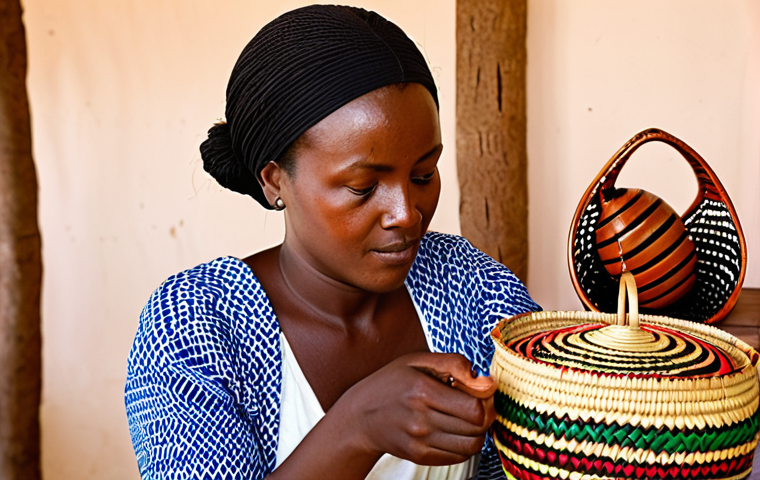
Oh, the rhythms! Let me tell you, there’s nothing quite like experiencing Rwandan music and dance firsthand. It’s not just a performance; it’s a story told through movement and sound. I remember being utterly captivated by the Intore dancers – their powerful movements, the vibrant costumes, the sheer energy that filled the air. You can find these performances at cultural centers and even some hotels, but try to seek out a more intimate setting, perhaps a village gathering, to truly feel the pulse of the music. It’s an experience that really stays with you.
1. The Power of the Drum
Drums are the soul of Rwandan music. Each beat carries a meaning, a history. When I first heard the royal drums, Ingoma, being played, I felt a vibration deep in my chest. It was like connecting to the very foundation of Rwandan culture. Some travel companies actually offer workshops where you can learn basic drumming techniques, which I highly recommend! It’s harder than it looks, but so rewarding.
2. The Grace of Traditional Dance
Rwandan dance is not just about steps; it’s about storytelling. The Intore dancers, with their spears and headdresses, depict battles and heroic tales. The women’s dances are often more graceful, celebrating fertility and community. Attending a performance is a must, but even better is participating. Some villages offer cultural immersion experiences where you can learn basic dance moves alongside local dancers. Believe me, you’ll laugh a lot, but you’ll also gain a deep appreciation for the artistry involved.
3. Immersive Musical Experiences
Beyond formal performances, look for opportunities to participate. Many community-based tourism initiatives offer drumming or dancing workshops. You might even stumble upon an impromptu musical gathering in a village. Don’t be shy – join in! These spontaneous moments are often the most memorable.
Crafting Connections: Exploring Rwandan Art and Handicrafts
Rwandan art is more than just decoration; it’s a reflection of the country’s soul. From the intricate Imigongo art to the beautifully woven Agaseke baskets, each piece tells a story. What struck me most was the dedication and skill that goes into these crafts, often passed down through generations. When I visited a women’s cooperative that specializes in basket weaving, I was amazed by their dexterity and the stories they shared about their craft. Purchasing these items directly supports local communities and helps preserve these valuable traditions. It’s not just about buying a souvenir; it’s about investing in the future of Rwandan art.
1. Imigongo Art: Geometric Wonders
Imigongo is a unique Rwandan art form using cow dung to create intricate geometric patterns. Traditionally, these patterns adorned the walls of houses, and each design held a specific meaning. Today, you can find Imigongo paintings on canvas, often painted in black, white, and ochre colors. Visiting an Imigongo workshop is a fascinating experience, allowing you to see the artists at work and learn about the symbolism behind the patterns.
2. Agaseke Baskets: Woven with Love
Agaseke baskets are iconic Rwandan handicrafts, known for their intricate weaving and vibrant colors. These baskets are traditionally used to store grains and other valuables, but they also serve as decorative items. Learning about the weaving process is fascinating, as each basket can take weeks or even months to complete. Buying an Agaseke basket directly from the artisan is a great way to support their livelihood and take home a piece of Rwandan culture.
3. Pottery and Wood Carvings
Beyond baskets and Imigongo, Rwanda boasts a rich tradition of pottery and wood carvings. Look for beautifully crafted bowls, vases, and sculptures that reflect the country’s natural beauty and cultural heritage. Local markets are great places to find unique and authentic pieces. Don’t be afraid to haggle respectfully, and always ask about the story behind the art.
Flavors of Rwanda: Culinary Traditions and Experiences
Food is a universal language, and in Rwanda, it speaks volumes about the country’s culture and history. Forget the bland hotel buffets – dive headfirst into the local cuisine! I had the pleasure of taking a cooking class in Kigali, and it was one of the highlights of my trip. Learning to prepare traditional dishes like Ugali (a type of maize porridge), Isombe (mashed cassava leaves), and grilled fish was not only fun but also incredibly insightful. And let me tell you, nothing beats the flavor of freshly prepared Rwandan coffee, grown on the country’s fertile hillsides. Seriously, ditch the Starbucks and embrace the local brew. Your taste buds will thank you!
1. Traditional Rwandan Dishes You Must Try
Don’t leave Rwanda without trying these local specialties: Ugali (maize porridge), Isombe (cassava leaves), Brochettes (grilled meat skewers), and Ibihaza (pumpkin stew). Each dish offers a unique flavor profile and reflects the country’s agricultural heritage. Ask your local guide for recommendations on the best places to try these dishes – often, the small, family-run restaurants offer the most authentic experiences.
2. Coffee and Tea Plantations: From Bean to Cup
Rwanda is renowned for its high-quality coffee and tea, grown on the country’s lush hillsides. A visit to a coffee or tea plantation is a must for any food lover. You’ll learn about the entire process, from planting and harvesting to roasting and brewing. And of course, you’ll get to sample the delicious results! Many plantations offer tours and tastings, and some even allow you to participate in the harvesting process. I particularly enjoyed a coffee plantation tour where I learned about the cooperative system that empowers local farmers.
3. Cooking Classes and Market Visits
For a truly immersive culinary experience, take a cooking class or visit a local market. Cooking classes will teach you how to prepare traditional Rwandan dishes, while market visits will expose you to the country’s diverse range of ingredients and flavors. Don’t be afraid to try new things! Ask the vendors for recommendations and sample local fruits, vegetables, and spices. Just be sure to wash everything thoroughly before eating.
Remembering the Past, Building the Future: Genocide Memorials and Reconciliation Efforts
Rwanda’s history is complex and, at times, deeply painful. The 1994 genocide against the Tutsi is a tragedy that the country continues to grapple with. Visiting the genocide memorials is a sobering but essential experience. It’s a chance to learn about the events that unfolded, honor the victims, and reflect on the importance of reconciliation. It’s not easy, but it’s a crucial part of understanding Rwanda and its people. From my understanding, the resilience and determination to rebuild the community by Rwandans are awe-inspiring.
1. Kigali Genocide Memorial: A Place of Remembrance
The Kigali Genocide Memorial is the most prominent memorial in Rwanda, serving as a final resting place for over 250,000 victims of the genocide. The memorial includes exhibits that detail the events leading up to the genocide, as well as personal stories and photographs of the victims. It’s a deeply moving experience that will leave a lasting impression. Be sure to allocate ample time for your visit, as there is a lot to take in.
2. Local Community Engagement and Reconciliation
Beyond the memorials, consider engaging with local communities to learn about the ongoing reconciliation efforts. Many organizations are working to promote healing and understanding between different groups. You might have the opportunity to visit a reconciliation village or participate in a community project. These experiences can be incredibly rewarding, offering a glimpse into the resilience and hope of the Rwandan people.
3. Understanding the Context
Before visiting the memorials, it’s helpful to do some background reading on the history of Rwanda and the events that led to the genocide. This will provide you with a deeper understanding of the context and allow you to appreciate the significance of the memorials. There are many books and documentaries available that offer valuable insights into this period of Rwandan history.
Nature’s Embrace: Exploring Rwanda’s Natural Wonders
While Rwanda might be famous for its gorillas, the country is blessed with plenty of natural beauty. Rolling hills, lush forests, and shimmering lakes make Rwanda an outdoor enthusiast’s paradise. I never thought I’d love birdwatching until I spent a morning in Nyungwe Forest National Park. The sheer variety of bird species was astounding, and the sounds of the forest were simply magical. Don’t forget to explore Akagera National Park for a classic safari experience. From what I’ve heard from people, Rwanda really offers something for everyone.
1. Gorilla Trekking: An Unforgettable Encounter
Gorilla trekking is undoubtedly the most popular activity in Rwanda, and for good reason. It’s an incredible opportunity to observe these magnificent creatures in their natural habitat. Trekking permits are expensive and require advance booking, but the experience is worth every penny. The hike can be challenging, but the reward of spending an hour with a gorilla family is simply unparalleled. Remember to follow your guide’s instructions carefully and maintain a respectful distance from the gorillas.
2. Nyungwe Forest National Park: A Hiker’s Paradise
Nyungwe Forest National Park is one of the oldest rainforests in Africa, offering a diverse range of hiking trails and wildlife viewing opportunities. The park is home to chimpanzees, colobus monkeys, and numerous bird species. The canopy walk is a must-do, offering breathtaking views of the forest canopy. Be sure to wear comfortable shoes and bring plenty of water, as the trails can be steep and challenging. I’d recommend hiring a local guide to enhance your experience.
3. Akagera National Park: Safari Adventures
Akagera National Park offers a classic safari experience, with opportunities to see lions, elephants, giraffes, and zebras. The park has undergone a remarkable transformation in recent years, thanks to conservation efforts that have reintroduced several key species. You can explore the park on a guided game drive or take a boat safari on Lake Ihema. Consider staying at one of the park’s lodges for a more immersive experience.
Navigating Rwanda: Practical Tips for Cultural Immersion
Getting the most out of your cultural experience in Rwanda involves more than just visiting tourist spots. It’s about being respectful, informed, and open to new experiences. Before my trip, I spent some time learning basic Kinyarwanda phrases, which was greatly appreciated by the locals. I also made an effort to dress modestly and avoid public displays of affection. These small gestures go a long way in building rapport and fostering meaningful connections. It’s the little things that make all the difference!
1. Language and Communication: Learn Basic Kinyarwanda
While English and French are widely spoken in Rwanda, learning a few basic Kinyarwanda phrases will enhance your interactions with locals. Simple greetings like “Muraho” (hello) and “Murakoze” (thank you) can go a long way in showing respect and building rapport. Don’t be afraid to try – even if you make mistakes, your efforts will be appreciated. Many language learning apps and websites offer basic Kinyarwanda lessons.
2. Cultural Etiquette: Dress Modestly and Respect Traditions
Rwandan culture is conservative, so it’s important to dress modestly, especially when visiting religious sites or rural areas. Avoid wearing revealing clothing and be mindful of local customs. Public displays of affection are generally frowned upon. When greeting someone, it’s customary to shake hands and maintain eye contact. Always ask for permission before taking someone’s picture. Remember, you’re a guest in their country, so treat their culture with respect.
3. Transportation: Getting Around Rwanda
Getting around Rwanda is relatively easy, with a range of transportation options available. Motorbike taxis (moto-taxis) are a common and affordable way to travel short distances, but be sure to negotiate the price beforehand and wear a helmet. Buses are a cheap and reliable way to travel between cities, but they can be crowded. Car rentals are also available, but driving conditions can be challenging, especially in rural areas. Consider hiring a driver for longer trips.
Sustainable Tourism in Rwanda: Making a Positive Impact
Travel can be a powerful force for good, and in Rwanda, sustainable tourism is playing a vital role in supporting local communities and protecting the environment. I was so impressed by the number of community-based tourism initiatives I encountered, from locally owned guesthouses to artisan cooperatives. By choosing these options, you can ensure that your money directly benefits the people who live and work in Rwanda. Plus, you’ll gain a deeper understanding of the country’s culture and challenges. It’s a win-win situation!
1. Supporting Local Businesses and Communities
One of the best ways to practice sustainable tourism in Rwanda is to support local businesses and communities. Choose locally owned hotels, guesthouses, and restaurants. Buy souvenirs directly from artisans and support their craft. Participate in community-based tourism initiatives, such as village tours or cultural workshops. By doing so, you’ll help to create economic opportunities for local people and ensure that your tourism dollars stay in the community.
2. Eco-Friendly Practices: Reduce Your Environmental Footprint
When traveling in Rwanda, be mindful of your environmental impact. Reduce your use of plastic by bringing a reusable water bottle and shopping bag. Choose eco-friendly accommodations that prioritize energy and water conservation. Respect wildlife and their habitats by following park regulations and avoiding disturbance. Support conservation efforts by donating to local organizations or participating in volunteer projects. Every little bit helps to protect Rwanda’s natural beauty for future generations.
3. Responsible Wildlife Encounters
When participating in wildlife activities, such as gorilla trekking or chimpanzee tracking, follow responsible tourism guidelines. Maintain a respectful distance from the animals and avoid feeding them. Do not touch or interact with the animals in any way. Support tour operators that prioritize animal welfare and conservation. By following these guidelines, you can help to ensure that wildlife tourism in Rwanda is sustainable and beneficial for both animals and communities.
| Activity | Description | Average Cost | Where to Book |
|---|---|---|---|
| Gorilla Trekking | Observe gorillas in Volcanoes National Park. | $1500 (permit) | Rwanda Development Board, licensed tour operators |
| Chimpanzee Tracking | Track chimpanzees in Nyungwe Forest. | $90 (permit) | Rwanda Development Board, licensed tour operators |
| Coffee Plantation Tour | Visit a coffee plantation and learn about the coffee-making process. | $30-$50 | Various coffee plantations, local tour operators |
| Cooking Class | Learn to prepare traditional Rwandan dishes. | $40-$60 | Local cooking schools, community-based tourism initiatives |
| Imigongo Art Workshop | Learn about Imigongo art and create your own piece. | $20-$40 | Imigongo art centers, local art workshops |
In Conclusion
Exploring Rwanda is more than just a trip; it’s an immersion into a vibrant culture, a journey through breathtaking landscapes, and a lesson in resilience. From the rhythmic beats of traditional music to the poignant stories of the genocide memorials, Rwanda offers a profound and unforgettable experience. Embrace the warmth of its people, savor the flavors of its cuisine, and discover the beauty of its natural wonders. You’ll leave with memories that will last a lifetime.
Good to Know Information
1. Currency: The Rwandan Franc (RWF) is the local currency. Credit cards are accepted in larger establishments, but cash is essential for smaller businesses and markets.
2. Tipping: Tipping is not customary in Rwanda, but it’s always appreciated for exceptional service. A 10% tip is considered generous.
3. Electricity: Rwanda uses European-style plugs (Type C and J). Bring an adapter if your devices use a different plug type.
4. Safety: Rwanda is generally a safe country for tourists. However, it’s always wise to take precautions against petty theft, especially in crowded areas. Be aware of your surroundings and avoid walking alone at night.
5. Health: Consult your doctor about recommended vaccinations and malaria prophylaxis before traveling to Rwanda. Drink bottled water and avoid eating raw or undercooked food from unreliable sources.
Key Takeaways
- Respect local customs and traditions.
- Support local businesses and sustainable tourism practices.
- Book gorilla trekking permits well in advance.
- Be prepared for a mix of emotions, from joy and wonder to sadness and reflection.
- Embrace the opportunity to learn and grow from your experiences.
Frequently Asked Questions (FAQ) 📖
Q: What makes Rwandan culture so unique and worth exploring beyond the usual tourist spots?
A: Having spent some time there myself, I can tell you it’s the raw, unfiltered connection you make with the people that truly sets it apart. Forget the manufactured experiences – think more along the lines of sharing a home-cooked meal with a local family in their village, participating in a traditional Intore dance where the drumming vibrates right through your bones, or learning the delicate art of Imigongo painting from a master artisan.
It’s about witnessing history and resilience firsthand, understanding their deep-rooted values, and experiencing a level of hospitality that’s just incredibly heartwarming.
That’s what gives Rwanda’s culture its genuine, unforgettable flavor.
Q: You mentioned community-based tourism is on the rise. Can you give me a specific example of how this works in Rwanda and why it’s beneficial?
A: Absolutely! I remember visiting a coffee cooperative in the Gakenke district. Instead of staying in a fancy hotel, I opted for a homestay with a family involved in the cooperative.
It was mind-blowing. I got to learn every step of the coffee-making process, from picking the beans to roasting them over an open fire. More importantly, the money I spent went directly into the community, supporting their education, healthcare, and infrastructure.
It’s a win-win. The tourists get a real, immersive experience, and the locals benefit economically and preserve their cultural heritage. That’s community-based tourism at its finest!
Q: Rwanda has a complex history. How does cultural tourism help to understand and reconcile with the past?
A: That’s a very important question. Cultural tourism in Rwanda isn’t just about pretty landscapes and dances; it’s also about confronting the country’s difficult past.
The Genocide Memorials are, of course, essential places to visit for reflection and remembrance. But what I found even more impactful were the opportunities to speak with survivors and hear their stories firsthand.
There are initiatives that support reconciliation through art, storytelling, and community dialogues. By engaging with these initiatives, visitors can gain a deeper understanding of the challenges Rwanda has faced, witness its incredible resilience, and contribute to a more peaceful and inclusive future.
It’s a powerful reminder of the importance of empathy and understanding in the face of adversity.
📚 References
Wikipedia Encyclopedia
구글 검색 결과
구글 검색 결과
구글 검색 결과
구글 검색 결과
구글 검색 결과
